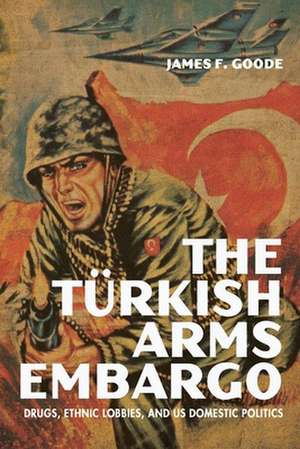The Turkish Arms Embargo: Studies in Conflict, Diplomacy, and Peace
Autor James F Goodeen Limba Engleză Hardback – 3 aug 2020
| Toate formatele și edițiile | Preț | Express |
|---|---|---|
| Paperback (1) | 215.75 lei 3-5 săpt. | +12.96 lei 7-11 zile |
| University Press of Kentucky – 30 aug 2022 | 215.75 lei 3-5 săpt. | +12.96 lei 7-11 zile |
| Hardback (1) | 305.83 lei 6-8 săpt. | +29.96 lei 7-11 zile |
| University Press of Kentucky – 3 aug 2020 | 305.83 lei 6-8 săpt. | +29.96 lei 7-11 zile |
Din seria Studies in Conflict, Diplomacy, and Peace
-
 Preț: 406.16 lei
Preț: 406.16 lei -
 Preț: 298.44 lei
Preț: 298.44 lei -
 Preț: 232.75 lei
Preț: 232.75 lei -
 Preț: 557.57 lei
Preț: 557.57 lei -
 Preț: 320.26 lei
Preț: 320.26 lei -
 Preț: 227.62 lei
Preț: 227.62 lei -
 Preț: 270.39 lei
Preț: 270.39 lei -
 Preț: 308.72 lei
Preț: 308.72 lei -
 Preț: 349.55 lei
Preț: 349.55 lei -
 Preț: 308.72 lei
Preț: 308.72 lei -
 Preț: 312.59 lei
Preț: 312.59 lei -
 Preț: 316.23 lei
Preț: 316.23 lei -
 Preț: 314.50 lei
Preț: 314.50 lei -
 Preț: 268.43 lei
Preț: 268.43 lei -
 Preț: 238.80 lei
Preț: 238.80 lei -
 Preț: 312.59 lei
Preț: 312.59 lei -
 Preț: 275.94 lei
Preț: 275.94 lei -
 Preț: 310.67 lei
Preț: 310.67 lei -
 Preț: 294.74 lei
Preț: 294.74 lei
Preț: 305.83 lei
Nou
Puncte Express: 459
Preț estimativ în valută:
58.52€ • 61.38$ • 48.72£
58.52€ • 61.38$ • 48.72£
Carte tipărită la comandă
Livrare economică 01-15 aprilie
Livrare express 25 februarie-01 martie pentru 39.95 lei
Preluare comenzi: 021 569.72.76
Specificații
ISBN-13: 9780813179681
ISBN-10: 0813179688
Pagini: 206
Ilustrații: 24 b&w photos, 2 maps
Dimensiuni: 152 x 229 x 16 mm
Greutate: 0.48 kg
Editura: University Press of Kentucky
Seria Studies in Conflict, Diplomacy, and Peace
ISBN-10: 0813179688
Pagini: 206
Ilustrații: 24 b&w photos, 2 maps
Dimensiuni: 152 x 229 x 16 mm
Greutate: 0.48 kg
Editura: University Press of Kentucky
Seria Studies in Conflict, Diplomacy, and Peace
Notă biografică
James F. Goode is professor emeritus of history at Grand Valley State University and former director of its Middle East Studies program. He is the author of The United States and Iran, 1946-51: The Diplomacy of Neglect, The United States and Iran: In the Shadow of Musaddiq, and Negotiating for the Past: Archaeology, Nationalism, and Diplomacy in the Middle East, 1919-1941.
Descriere
An analysis of factors leading to the imposition and continuance of the Turkish Arms Embargo.
